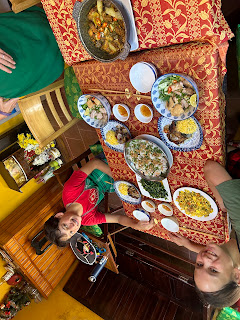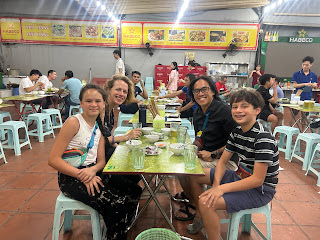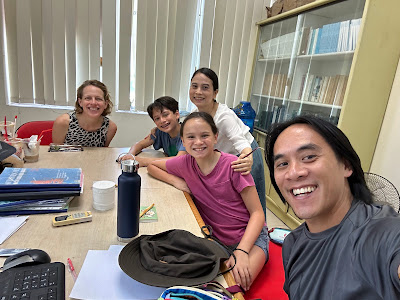While in Hue, we spent a day exploring the Phuong Nha caves, part of the largest cave system in the world. They were discovered just over a decade ago by a farmer who was hunting in the mountains and found a 4 meter square hole that led down into a cave system that encompasses many kilometers. The formations in this cave system are otherworldly - the stalactites and stalagmites have an almost organic quality.
We went to a second cave that we accessed by zip line and a short swim - the Dark Cave. Elliot developed a stomach ache so waited for us outside. Inside this cave, we were quickly enveloped by an impenetrable darkness, and the path narrowed into a mudlined slipstream, barely wide enough for your feet one in front of the other. So, a dark, enclosed, muddy space with one of your kids ill outside - basically Holly’s nightmare fuel.
Elliot was fine when we emerged, and we had a great time playing in the waterpark with dozens of Vietnamese tourists frolicking, climbing, swimming and paddleboarding. I’m not sure it occurred to anyone that one could stand on the boards, but we modeled it and soon enough others were trying it.


The highlight of this tour for me was getting to chat, mostly in Vietnamese, with our guide, Linh. We talked about how hard things were in the 90’s and how the sense of opportunity has been growing in Vietnam for the past 20 years. He told me that nearly everyone who can hustle can make a million VND a day, and keep their living expenses to 100K VND a day. In a couple of years, you can save to buy a car or a house, and establish a pretty good life for yourself. Linh told me that he was actually trained as a construction engineer and had spent time in Singapore working like a dog to achieve what he called “a big dream” but that it took a toll on his health and happiness. He eventually returned home to take care of his aging parents, and in his own words he “made his dreams a little smaller”. But he was happier now, overall, and enjoying his life with his wife and two kids.
Later that evening, we returned to Imperial Beer and talked at length with the owners, Sean and Hang. We asked Sean how he came to settle in Vietnam from southern California and talked with Hang about how Vietnamese people were experiencing life in the current moment. These two conversations echoed each other and the earlier conversation I had with Linh. Sean told us about coming in 2009 and hanging out with a friend, working to make a little money in the morning and then being able to enjoy the late afternoon and evening having a coffee, some beers, and then a delicious dinner. He asked his friend, “is this your life?”, obviously calling the question of what was so valuable about his life in the US.
Hang said that being Vietnamese right now is about hustling, but still taking time to be with friends and family, eating and drinking together on the street. I asked her a question about corruption, whether it felt like anything was systematically unfair or stacked against those less powerful. From her perspective, it seemed like there wasn’t that much outright corruption from government officials, but something similar to what happens routinely in the US: work your government job for a bit, build up connections and a network, then become a highly paid consultant for a big corporation.
We joke about “late stage capitalism” on social media in the US, and rightly decry its hypocrisy and absurdity. But what I think I’m seeing in Vietnam is a reminder of the energy of early-stage capitalism. We wondered if this is what American felt like in the 50’s - when people could make a living wage without killing themselves and when at least white folks in America thought that there was enough good work and resources to go around, and that everyone could do dignified work and make a good life for themselves. Hard to say that most people feel that right now. In thinking about what happened in the US, and what doesn’t seem to have happened yet in Vietnam is at least a few of these things: Stratification of value, cost of living explosion and elite capture.
Stratification: it really felt like everyone’s work was regarded as roughly of equal value. Our numerous drivers really seemed to feel like it was a great living. Most of the food vendors seemed genuinely happy doing the work they were doing. This is not to say that there aren’t definite class issues and markers of status, colorism is a powerful force and professional office work is esteemed. But I never got the sense that individuals resented their lot in life, most of the time, it felt like people were living lives of joy and dignity. And of course, much of the attainability of a good life has to do with feeling like the necessities of life being available at a reasonable cost.
But what feels like also such a big differentiator right now is the extent of corruption - both outright abuse of power, but also the relatively more subtle kinds of elite power hoarding that characterizes so many of the world’s more developed economies. Of course, just before we arrived, a Vietnamese woman was sentenced to death for essentially corrupting the entire banking system, so people are clearly taking advantage of the current system. At the moment though, it feels here the standard of living is rising fast enough for everyone that even extreme wealth at the top end is acceptable.
In the US, the past 40 years has shown us clearly that a rising tide does NOT raise all boats sufficiently. But that calculus feels different in Vietnam, but it feels like such a fragile moment - will we look back at this time and see it like Russia in the 90’s, when increasing economic liberalization led to rise of an elite oligarchy? Will it feel like the US in the 70s and 80s when we undermined social services, collectivism and cemented our cult of individualism? Being here this time has made me want to follow this question more closely, and having made more contacts and whatsapp friends this time around hopefully will allow me to use my Vietnamese to keep tabs on how the country continues to evolve.



















.jpg)

























